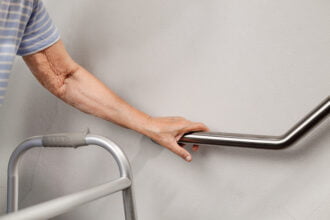A vast majority of senior Americans desire to retain their independence, yet two in ten elders in the country are either unable to accomplish their daily tasks without assistance or find it challenging to do so. A study published by the Georgetown University shares that over 90 percent of senior Americans prefer staying at home as they age, however, they haven?t taken any necessary steps to make their dwelling senior-living-friendly. Technology is making its presence felt in the senior care domain by enabling the aging population to live independently. As the senior population in the United States is expected to double by the year 2050 (83.8 million), an increasing number of technology firms are coming up with innovative solutions to overcome the various impediments challenging their independence. Here are seven ways you can use technology to retain the independence of your seniors life, enabling him/her to remain connected, mentally active, and physically safe.
1. Senior-Friendly Smartphones and Tablets
In recent times, numerous seniors are trying their hands on embracing the world of technology. However, they often find it challenging to use the technologically advanced gadgets available in the market. A number of technology firms have introduced senior-friendly mobile phones, tablets, and e-reading devices, enabling older adults to entertain, engage, and educate themselves with ease. Smartphones and other IoT-enabled devices, empower seniors with the latest information in every sphere of life. For instance, if your senior desires to assess his/her long-term care options; a simple search on senior living near me can yield numerous results within a few seconds. Other elder-friendly devices, namely tablets and virtual applications use advanced computer intelligence systems and remote caregivers? teams to offer constant personalized care and emotional support to seniors. Each of the above-mentioned smart devices is lightweight and offers features such as large display screen, adjustable resolution, hearing aid compatibility, front-and-rear-facing camera, and easy-mode option. You can choose one for your senior based on his/her needs and preferences.
2. Wearable Devices and Sensor Units
Most wearable gadgets are GPS-enabled and come with emergency-calling options, making life safer for elders. A few of these gadgets also offer remote-monitoring systems and use smart algorithms and sensor data to establish routines and/or identify crises. Devices like Fitbit Charge 2 and Alert1 enable seniors to monitor their fitness parameters. They allow seniors to track their body weight, body mass index, body fat percentage, distance walked, and calories burnt in a non-invasive manner. GPS-enabled soles are equipped with satellite monitoring and real-time tracking. These, if inserted in the seniors? shoes are a great way to know their location. This wearable technology can help you keep a watchful eye on your senior, especially if he/she is suffering from dementia, autism, or any other cognitive or memory disorder. Wearable devices enable you to remotely monitor your senior and notify you of falls and accidents, if any. Consequently, these devices assure you of your parent?s safety and retain his/her independence.
3. Home-Assistance Devices
Memory, cognitive, and motor impairment is extremely common in seniors over 65 years of age, severely affecting their ability to perform the activities of daily living (ADL). Installing technologically-advanced home-assistance devices such as motion-sensing LED lights, adaptive switches, telephone amplifiers, light-enhanced phone diallers, and automatic gas-and-water shutoff devices, can help your senior perform his/her routine activities independently.
4.Medication-Compliance Applications
On an average, Americans over 70 years of age are prescribed nearly 12 pills a day. Consequently, compliance with medications is a big challenge in the aging population. Technological innovations such as telehealth, medication trackers, and automated pill dispensers can help you and your senior to administer the prescribed doses of medications in a timely manner. Numerous firms are using technology to address the issue of medication non-adherence in this age group. For instance, AdhereTech, a New York-based healthcare startup, has developed a battery-powered smart pill bottle that measures the amount of medication dispensed and uses the touch-screen technology to transmit this data to the patient?s caregivers and healthcare team.
5. Smart Home Security Tools
Seniors living alone need additional security. According to the Crime statistics, in the year 2014 alone nearly 60 percent of the elderly population were victims of a violent crime. With an increasing number of Baby Boomers crossing the 65-years mark, safeguarding their life becomes imperative. Smart technology comprising of motion sensors/detectors, depth-sensing cameras, emergency alarms, digital locks, and other wireless home security technology devices can enable your senior to live safely, retaining his/her independence. These devices have the ability to connect with smartphones and can trigger an alarm in case of any emergency or a mishap.
6. Artificial Intelligence
Autonomous robots, chatbots, and virtual assistants are helping elders maintain their independence and perform the activities of daily living with ease. Though artificial intelligence cannot replace human interaction, it offers remarkable features that can enable you and your senior to monitor his/her health and even alert the medical team in case of an emergency. For instance, an artificial intelligence device called Elliq can store your senior parent?s preferences and habits and use this data to recommend activities, offer medication reminders, and connect him/her to you and other family members.
7. Smart Entertainment Options
Isolation and loneliness in seniors
can severely affect their physical and emotional wellbeing. If your senior enjoys watching television, consider investing in a large flat-screen smartboard that is easy-to-use and can keep your elder engaged with his/her favorite show. Smart televisions and laptops also offer a platform for social interaction using applications such as Skype, Google Hangouts, and WhatsApp, enabling your senior to communicate with long-distance family members in real time. Seniors cherish their independence and often feel disheartened when they have to rely on their family for care and attention. Technology can enable your elder to live with minimum assistance, boosting his/her confidence and self-esteem. The aforementioned technology tools can help your senior live independently, improving his/her overall quality of life.







